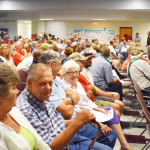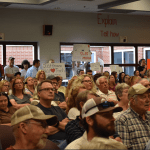Landfill approved by board
Published 4:25 pm Monday, July 2, 2018



Members of the Cumberland County Board of Supervisors voted to approve the rezoning request, conditional use permit and the host agreement for the Green Ridge landfill facility early Friday morning after a meeting that lasted for about six hours and featured nearly 80 public comments, the majority opposed to the landfill.
Tensions were high early on at the meeting, which began shortly after 7 p.m. Thursday at Cumberland County Elementary School and went into 1 a.m. Friday morning.
Citizens held signs and graphics detailing the landfill site’s proximity to wetlands, offered to help the county find alternative business options and asked the county to consider the traffic and health impacts on families and neighboring counties.
Attorney with Green Ridge William Shewmake gave a presentation on the landfill and addressed questions and concerns about the site. Jerry Cifor, senior vice president of County Waste of Virginia, also spoke, addressing the legal allegations read by two members of the audience
Board members voted 3-2 to approve the request to rezone 15 parcels of land designated as Agricultural-2 and Residential-2 to Industrial (M)-2, with District One Supervisor Bill Osl making the motion to approve. District Four Supervisor David Meinhard asked for a roll call vote in which each board member would audibly say “yay” or “nay.”
Osl, Meinhard and District Five Supervisor Parker Wheeler voted in favor of the rezoning request. District Two Supervisor Lloyd Banks and District Three Supervisor and Chairman Kevin Ingle voted in opposition.
Board members voted 3-2 to approve the conditional use permit after a motion made by Meinhard. Osl, Meinhard and Wheeler voted in favor of the conditional use permit, and Banks and Ingle voted in opposition.
Wheeler made a motion to move the community host agreement adoption to a future meeting. Ingle, who made a similar motion, withdrew his for Osl to make a substitute motion. Osl made a motion to approve the community host agreement, but contingent on three items: the first, establishing “mutually agreed upon language” between the county and Green Ridge for compensation for property owners in close proximity to the landfill site.
“That’s been an issue,” Osl said. “I think it’s a valid point, and I think it needs to be more thoroughly addressed.”
The second item was to have County Waste of Virginia as the guarantor of the agreement, not Green Ridge, LLC, and the third item was to delete fly ash as a cover located on Page 5 of the host agreement draft under acceptable waste products.
Osl, Banks, Meinhard and Wheeler voted in favor of approving the host agreement with the conditions, and Ingle voted in opposition.
Meinhard added a meeting item and made a motion asking the board to approve a requirement that a minimum of 25 percent of landfill revenue, up to a maximum of 50 percent, be used to reduce real estate tax rates for Cumberland citizens. After Osl asked for clarification, Meinhard said the landfill revenue he is referring to is the host fees. The vote was carried 3-2, with Osl, Banks and Meinhard voting in favor and Ingle and Wheeler voting in opposition.
Meinhard expressed criticism about the attitude toward the landfill, noting other examples, such as a past jail and power station, where residents fought against the property and the board supported it. He said he lived 15 miles from the site.
Ingle, who said he lives 9 miles away from the facility site, said in response to citizen concern that the county does not have resources such as a grocery store, that the county is waiting for a grocery company to approach them. He said he welcomed suggestions for businesses.
Osl said the board used funds from reserves to balance the $500,000 deficit present in the 2018-2019 budget, the amount cited as caused by retaining its contract with Container Rentals LLC, owned by van der Linde Recycling & Container Rentals that saw increased fees and increases in county health insurance. He said the county population is declining and a segment of the population lives below the poverty level. He said the county needed to look at options to keep tax rates down.
Referencing a statement by speaker Robert Bishop about using common sense, Osl said the landfill would act as a solution.
“Commercial businesses are what’s necessary in order to generate revenue that provides an ease to the burden of property taxes,” Osl said.
He said Powhatan individual residents may not see benefits from the landfill site, but that some Powhatan businesses will benefit, and that residents who are served by County Waste will have an alternative tipping site at competitive rates.
Osl and Meinhard directed similar comments to citizens citing alleged resistance to major economic opportunities in the area.
Osl, directing his comments to Carson Tucker, chairman of the Powhatan County Board of Supervisors who attended the meeting, said the Powhatan Board’s decision to approve subdivisions and a Walmart store and other projects have resulted in thousands of additional trucks on the road.
Osl questioned why Cumberland is receiving a “hissy fit” over approximately 250 trucks as audience members reacted with disapproval.
Banks did not speak during the comment period.
Wheeler said he received calls from constituents who said they were in favor of the landfill, but were hesitant to speak due to the audience members’ vocal stance in opposition to the landfill.
Wheeler expressed frustration at the resolution presented by the Powhatan County Board of Supervisors asking Cumberland to not approve the landfill.
“It’s kind of like a big, rich person trying to hold a not-so-rich person down,” Wheeler said.
Ingle defended Powhatan County, saying he understood county leaders looking out for their constituents, and understood the county’s concern about the traffic impact.
He asked the Cumberland board to help him support Powhatan.
PUBLIC COMMENTS
Approximately 44 people spoke during the public hearing for the rezoning request. Approximately 34 people spoke for the conditional use permit. At the beginning of the hearing, Ingle said members of the public were not allowed to give the three minutes they were allocated to speak to other people, something done during the planning commission public hearings.
As the night went on, several people who signed up to speak had to leave either due to having to wake early to leave for work. Some people, when called, asked not to speak.
Cecil Youngblood asked the board to consider all of the details available about landfill operations before making a decision, concerned that the process was moving too quickly.
“Don’t get into this this fast without researching,” Youngblood said. “The money will still be there. But don’t go in blind … You will take us blindly into something I don’t think you understand yet.”
He noted the potential damage leachate could have. He said he pumped leachate out of a closed landfill in Goochland and said he had skin burned off of his arm.
Two audience members, Victoria Ronnau and Jacqueline James, read court cases that involved Cifor. Ronnau’s cases took place during Cifor’s term as senior vice president and chief financial officer of Casella Waste Systems from 1994 to 2001.
Cifor himself addressed the audience and said the information was incorrect.
He said one case had taken place before he served his position at Casella. He cited the information from speakers was “so far off the mark it’s ridiculous.”
Jim Sharp, of Lynchburg who serves as adviser for an organization based in Cumberland and Powhatan in opposition to the landfill, cited a quote from Bob Burnley, a former director of Virginia Department of Environmental Quality, about leakage at landfill sites.
“They all leak. We all know they all leak, and the wells are there to track the leachate plume when they do,” Sharp cited.
As a continuation of that idea, Sharp and Burnley contacted The Herald Saturday and cited that leakage is potentially possible, even after a long period of time.
“These landfills are immortal,” Burnley said in an email. “If it takes 50 years to start leaking they still pollute the groundwater. They brag about the liners being tested for 25 years. What happens after that?”
Speakers also expressed concern about the company, Green Ridge LLC, that County Waste of Virginia would not be liable for the Green Ridge operations.
Robyn Cochran said the proposed site is approximately a half mile from the back side of her property. She said the landfill would completely change the trajectory of her family and others like her, who are looking to retire or raise their families.
“We’ve had two meetings a week for the last four weeks,” Cochran said. “We’ve been in all of them. We’ve heard it all. Why can’t you guys take into consideration what you’re hearing from us?”
She said she and her husband, Tom, went from door to door to speak to participants about the landfill. She said a lot of neighbors did not know about the project or where it would be located. “They’re just now hearing about this,” Cochran said.
Robert Bishop said his father had been killed after being struck by a truck whose driver fell asleep. He said that Cumberland County residents are well educated, but quipped that the best form of education is common sense.
He asked the board to consider the traffic impact on Route 60, saying the board’s decision in favor of the project would leave an “irreversible impact.”
Two people spoke in favor of the Green Ridge facility. Both requested for the board and County Waste of Virginia to take concrete steps to compensating residents who live close to the facility.
Roger Hatcher said he supported the landfill and commended Meinhard for holding the district meeting June 22. He said he worked in waste management industries since 1968, and said projects he has undertaken have seen similar audiences with concerns.
He expressed concern that the conditional use permit has “No mechanism to ensure that the compensation for the 20 or plus families owning land directly adjacent to the proposed landfill is adequate. It’s suggested, but it’s not stated.”
He expressed concern about the county’s transfer stations, saying that if they closed due to Green Ridge it could potentially leave waste in the woods.
Beverley Speas, who was against the landfill, also expressed concern about the transfer stations located in the county, and if they are potentially closed that it would cause residents to have to drive up to 30 miles to the landfill site.
Will Hatcher, who lives on Miller Lane, said he may be the only resident on the lane in favor of the project.
He said as an agriculturalist, he said he respects the rural aspect of the county, though said funding services such as the fire department and law enforcement was also important. The landfill would be approximately 25 feet from his home. He asked that County Waste and Cumberland County make an agreement to help those directly affected by the project.
“My request is that you do right by us who are directly affected,” Hatcher said. “Do right by those of us who live on Miller Lane, Alder Lane, Pinegrove Road and everybody else directly affected. Define that line as far out as you can, as broadly as you can. Take care of us, and take care of agriculture in this county.”
THE NEXT STEP
Cifor said in a statement after the meeting that the next step in the process would be to negotiate items on the host agreement and finalize it with the county.
He said he and the developers would have what is called a “scoping” meeting with the Virginia Department of Environmental Quality (DEQ) to determine the work needed to be done before they submit the Green Ridge site application to the DEQ.
Cifor said Green Ridge has already done work with The Army Corps of Engineers on wetlands delineation, but would still need to sit down with the Corps of Engineers and negotiate mitigations.
He said the landfill is expected to have multiple public hearings during this process.
He said regarding the county’s discussion on compensation for property owners affected by the landfill, that the conditions would be added to the community host agreement and be legally bound. Cifor said the finalized host agreement would be a public document.
“We said it verbally, so we don’t mind putting it in writing,” Cifor said.
“We’re sensitive to the residents’ concerns, especially the neighbors that are impacted by the landfill,” Cifor said.








